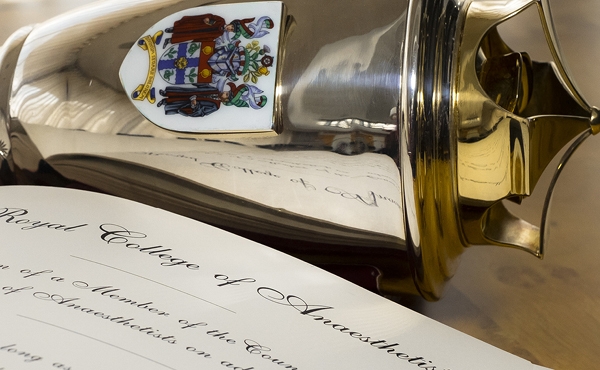Authors:
- Dr Lulu Rashid, CT3 ACCS Anaesthesia, Gloucestershire Hospitals NHS Foundation Trust
- Tina Kowalewicz, former Practice Development Nurse, Gloucestershire Hospitals NHS Foundation Trust
- Dr David Luther, ST5 Anaesthesia, Gloucestershire Hospitals NHS Foundation Trust
A recent high-profile death due to undetected oesophageal intubation has raised awareness of this Never Event, and a huge amount of beneficial training has emerged. Our trust not only participated in the subsequent international campaign, but also built on this by creating our own local platform, which has been integrated into theatre practice and designed to take only five minutes away from precious theatre time.
Background and inspiration
Following the avoidable death of Glenda Logsdail, the coroner issued a ‘Prevention of future deaths’ report.1 This outlined explicit actions to be taken nationally and triggered a powerful campaign driven by a collaboration between the Royal College of Anaesthetists, the Difficult Airway Society and the Association of Anaesthetists. The output of this campaign included an educational video (‘No trace = wrong place’)2 and ‘Unrecognised oesophageal intubation’ flashcards.3 These flashcards took only five minutes of theatre time, and aimed to address two key issues: to increase awareness of capnography, and to empower all team members to speak up and challenge in a crisis. Crucially, the flashcards were designed to be discussed among the whole theatre team, not just anaesthetists and anaesthetic assistants.
The phrase ‘those who work together should train together’ first appeared in a House of Commons Health Select Committee report in 2009,4 and was attributed to the Clinical Human Factors Group. Since then, it has appeared in several important publications, including NHS England’s National safety
standards for invasive procedures5 and National maternity review.6 Meanwhile, regular, multidisciplinary team training is one of the standards for the RCoA’s Anaesthesia Clinical Services Accreditation (ACSA) scheme7 and is recommended by the Guidelines for the Provision of Anaesthetic Services (GPAS).8 Pressures on theatre time mean that training together as a theatre team can be a challenge for departments to deliver.
Our hospital’s actions
At Gloucestershire Hospitals NHS Foundation Trust, the ‘Unrecognised oesophageal intubation’ flashcard campaign was successfully rolled out. Feedback included comments such as:
- ‘More please!’
- ‘A weekly flash card sim would be beneficial’
- ‘Breaks down barriers, allowing all staff to speak up’
- ‘Good to stimulate discussion’
- ‘Surgical consultant educated on where to find emergency bell!’
Inspired by this feedback, we developed ‘five-minute flashcards’ with the aim of integrating regular multidisciplinary team training into our theatre routine, of improving knowledge and teamwork, and of ultimately enhancing patient safety. We discussed the concept with our local leads for anaesthesia, surgery and theatres, and their support helped hugely with implementation.
The flashcards are discussed once a week at the WHO morning brief with all members of the team present. The flashcards cover a range of topics relevant to the whole team. The content can be technical (eg, surgical site infections) or non-technical (eg, civility). They are designed to be interactive, light-hearted in places, and to stimulate discussion. Theatre teams are encouraged to start a timer and stop discussion after five minutes whether they have finished the card or not, and to go off topic if they want.
The first five flashcards were distributed and discussed in our theatres (24 theatres across two sites) over a five-week period in May and June 2022. The first flashcard was discussed on a Monday morning,
the second on a Tuesday, and so on. We produced and discussed further sets of five flashcards over five-week periods in July/August and September/October. All 15 flashcards can be seen on the Gloucestershire Hospitals NHSFT website.
While earlier ideas for flashcards were brainstormed by our team, we have increasingly been contacted by members of the theatre teams requesting topics. For example, out trust recently carried out a major-incident planning exercise, and a flashcard on ‘handling evidence’ was produced to coincide with this. Flashcards have been written by nurses and doctors, consultants and trainees, and anaesthetists and surgeons.
We believe the benefits of the discussions are not only acquisition of knowledge from the content of the flashcard, but also the improved teamworking and flattening of hierarchy that come from the discussion itself, regardless of what is discussed.
Please get in touch if you would like tips on developing five-minute flashcards in your trust!
References
- Inquest into the death of Glenda May Logsdail. Regulation 28: Report to prevent future deaths.
- Capnography: No Trace = Wrong Place. RCoA.
- Unrecognised Oesophageal Intubation Flashcards. RCoA.
- Health Committee Minutes, 3 July 2009.
- National Safety Standards for Invasive Procedures (NatSSIPs). NHSE, 2015.
- National Maternity Review: Better Births. NHSE, 2016.
- Anaesthesia Clinical Services Accreditation Standards. RCoA.
- Guidelines for the Provision of Anaesthesia Services. Chapter 1: The Good Department. Recommendation 3: Education and Training. RCoA.
More from the Digital Bulletin
- Bulletin: April 2023
- Training and careers
Spotlighting the achievements of SAS doctors
- Bulletin: April 2023
- Training and careers
Meet your new Council members
- Bulletin: April 2023
- Training and careers





